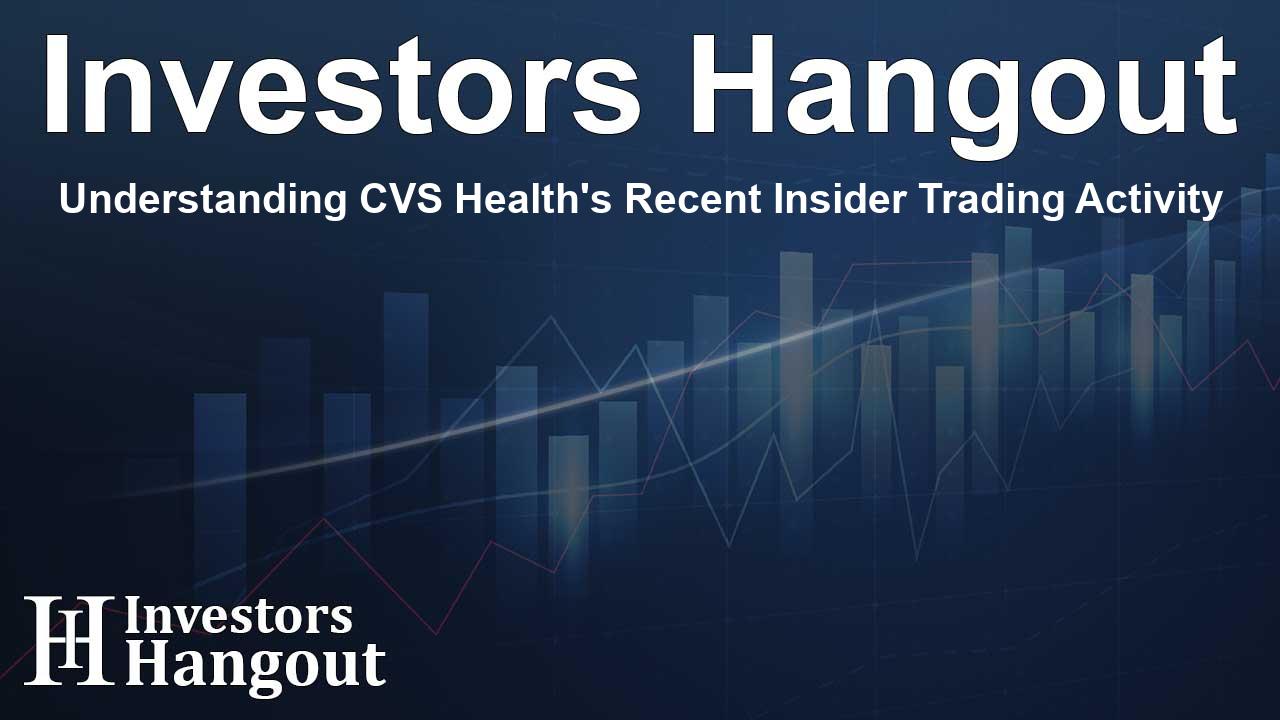Understanding CVS Health's Recent Insider Trading Activity

Understanding CVS Health's Insider Trading Activity
Nancy-Ann M. DeParle, serving as a Board Member at CVS Health (CVS), recently made waves with her acquisition of shares. According to a filing with the SEC, DeParle invested in 2,331 shares valued at approximately $133,100. This insider purchase signals a confident outlook regarding the company's future performance.
Recent Share Performance Overview
Following the announcement, CVS Health stocks witnessed a slight decline of 2.09%, trading at $58.82. Despite this drop, the context surrounding insider trades can provide vital insights for investors.
About CVS Health
CVS Health is a multifaceted healthcare provider rooted in retail pharmacy. With a network extending over 9,000 locations, CVS operates primarily within the healthcare sector, processing around 2 billion claims annually through its pharmacy benefit management services. The company's significant presence is further bolstered by its insurance arm, initially acquired through Aetna, which serves approximately 26 million members. Recently, CVS expanded its services with the acquisition of Oak Street, enhancing their primary care offerings and creating potential synergies across its vast business portfolio.
Exploring the Financial Health of CVS Health
Revenue Growth: As of the latest reported period, CVS Health's revenue growth stood at 6.31%, reflecting an encouraging upward trend. Yet, it is important to note that this growth rate is comparatively lower than the industry average within the healthcare sector.
Profitability Concerns:
Gross Margin: Currently, CVS Health faces challenges with a gross margin of just 13.16%, suggesting potential difficulties ahead in maintaining profitability against competitors.
Earnings per Share (EPS): With an EPS of 0.07, CVS Health's performance sits below the industry's average, causing concerns among investors.
Managing Debt: CVS Health's debt-to-equity ratio stands at 1.1, which is below the industry average. This healthy leverage ratio indicates a more prudent approach, lessening reliance on debt, which is generally favorable in the eyes of investors.
Valuation Assessment:
Price to Earnings (P/E) Ratio: The P/E ratio of 15.25 reveals that CVS is potentially undervalued compared to its industry counterparts.
Price to Sales (P/S) Ratio: Holding a P/S ratio of 0.21, CVS Health's valuation indicates a buying opportunity for discerning investors looking at sales performance metrics.
Enterprise Value to EBITDA: CVS Health showcases a below-average EV/EBITDA ratio of 10.47, which might attract value investors seeking promising propositions in the market.
Market Capitalization Insights: CVS Health’s market capitalization is larger than many of its competitors, reflecting a solid position within the healthcare sector.
Understanding the Impact of Insider Transactions
Transactions executed by insiders can significantly influence investor perceptions, though they should not solely dictate investment decisions. In the financial world, 'insiders' typically refer to directors, officers, or beneficial owners of more than ten percent of a company's equity, as defined in Section 12 of the Securities Exchange Act. Insider transactions are publicly reported via Form 4 filings, allowing investors insight into the stock's future expectations based on these internal movements.
The Importance of Transaction Codes
For investors scanning Form 4 disclosures, recognizing the significance of transaction codes is crucial. A P indicates a purchase, whilst a S denotes a sale. Other codes, such as C for option conversion or A for security grants, are also integral to understand insider activities thoroughly.
Conclusion: Making Sense of Insider Trends
Insider trading activity, like that of Nancy-Ann DeParle, can provide valuable insights regarding CVS Health's future potential. While shares may experience volatility, the confidence demonstrated through such purchases gives a glimpse of optimism from those within the company. Ultimately, investors should consider these transactions alongside broader financial metrics to inform their decisions in a fast-evolving market.
Frequently Asked Questions
What does insider trading imply?
Insider trading refers to the buying or selling of stocks based on non-public information by individuals who have access due to their positions within the company.
How does CVS Health perform in the healthcare sector?
CVS Health ranks among the top players in healthcare, offering a broad range of services including pharmacy management and health insurance.
What is the significance of the P/E ratio?
A P/E ratio helps investors gauge the relative value of a company's shares in relation to its earnings, assisting in identifying undervalued stocks.
Why is the debt-to-equity ratio important?
This ratio indicates a company's financial leverage and stability, with a lower ratio typically signaling less risk for investors.
How can investors access insider transactions?
Investors can track insider transactions through SEC disclosures, specifically Form 4 filings that reveal buying and selling activities of company insiders.
About Investors Hangout
Investors Hangout is a leading online stock forum for financial discussion and learning, offering a wide range of free tools and resources. It draws in traders of all levels, who exchange market knowledge, investigate trading tactics, and keep an eye on industry developments in real time. Featuring financial articles, stock message boards, quotes, charts, company profiles, and live news updates. Through cooperative learning and a wealth of informational resources, it helps users from novices creating their first portfolios to experts honing their techniques. Join Investors Hangout today: https://investorshangout.com/
Disclaimer: The content of this article is solely for general informational purposes only; it does not represent legal, financial, or investment advice. Investors Hangout does not offer financial advice; the author is not a licensed financial advisor. Consult a qualified advisor before making any financial or investment decisions based on this article. The author's interpretation of publicly available data shapes the opinions presented here; as a result, they should not be taken as advice to purchase, sell, or hold any securities mentioned or any other investments. The author does not guarantee the accuracy, completeness, or timeliness of any material, providing it "as is." Information and market conditions may change; past performance is not indicative of future outcomes. If any of the material offered here is inaccurate, please contact us for corrections.